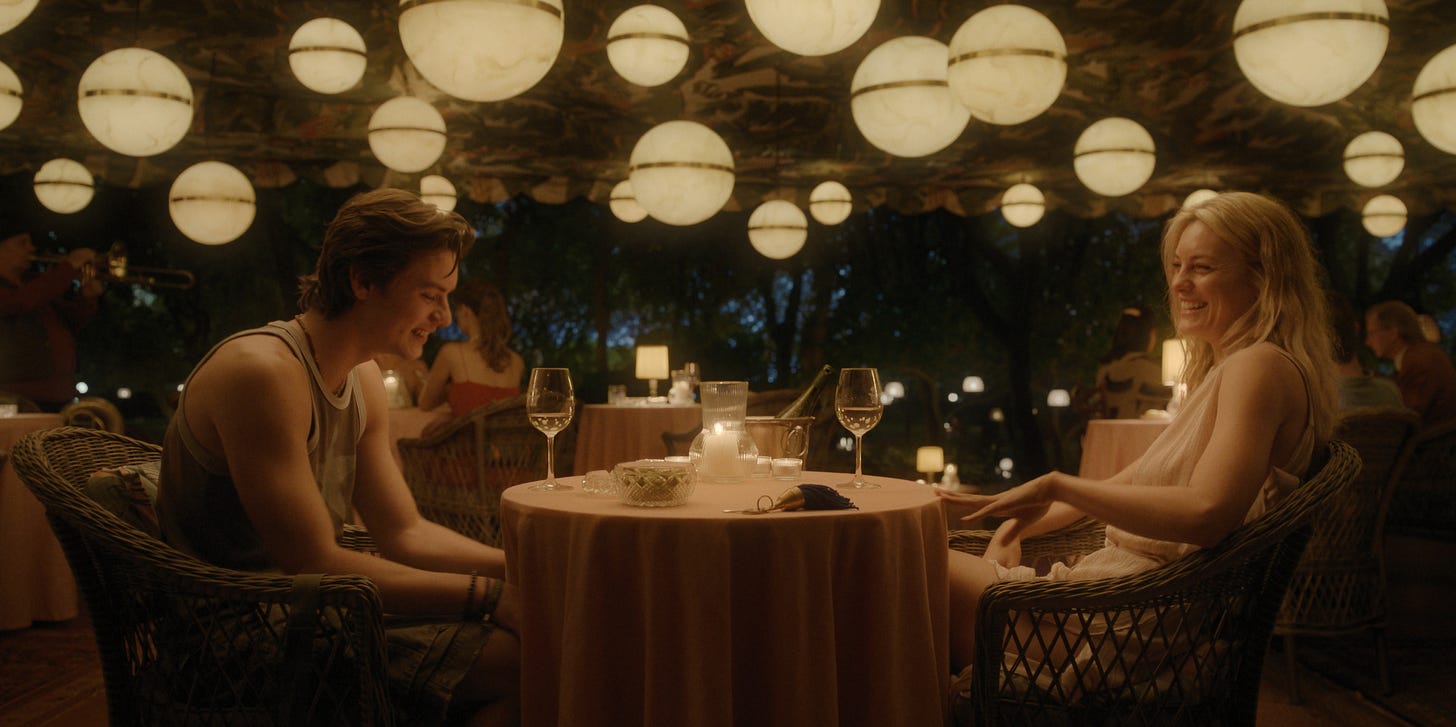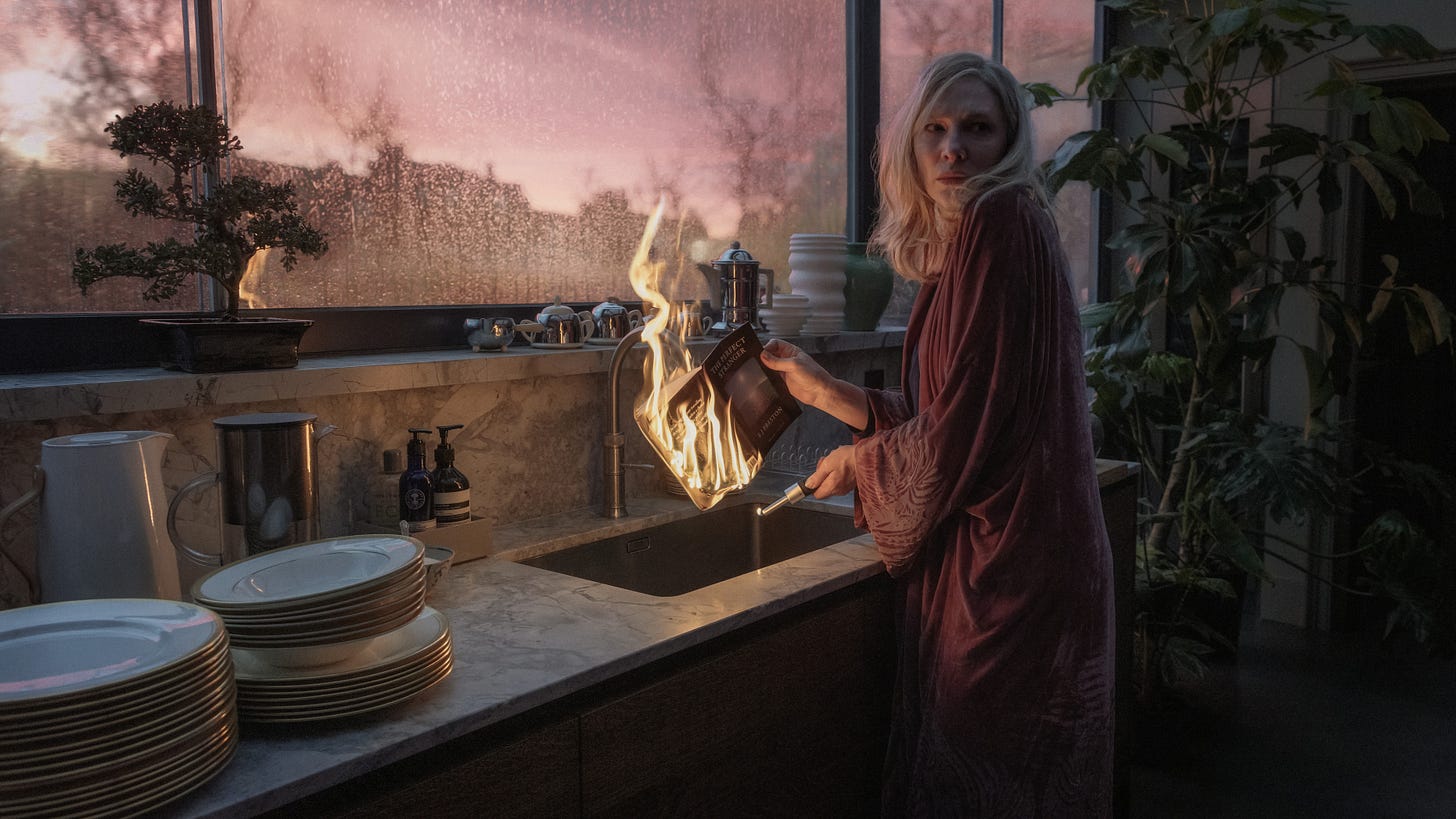The Review: 'Disclaimer' Is Unlike Anything You've Seen Before
Alfonso Cuarón's seven-part thriller paves glorious new ground in an age of stale limited series, with a stylish and provocative web of truth and fiction you won't soon crawl out of.
Welcome back to Top Shelf, Low Brow. This is The Review, a regular edition that looks closer at movies, music, and television. This time, it’s Disclaimer, Alfonso Cuarón’s bold and bewitching limited series that asks you to sit up, pay attention, and open yourself up to the world’s wicked ways to find path toward the light.
From its start, there is something just left-of-center about Disclaimer. Alfonso Cuarón’s seven-part limited series adaptation of Renée Knight’s novel—which airs its first two episodes Oct. 11 on Apple TV+—begins with an iris shot that opens to reveal the rising sun. The glow of new daylight falls onto Jonathan Brigstocke (Louis Partridge) and his girlfriend Sasha (Liv Hill), two teenage lovebirds going at it in the sleeping compartment of a train tracing the Italian countryside.
It’s a bizarrely stylish way to open a limited series, especially considering that the format has essentially become the norm in serialized television. The prevalence of the once-rare limited series has caused the structure to lose much of the luster it once boasted. Now these things are conceived, written, shot, and sent down the factory line onto the streamer of your choice without so much as a single innovative thought, let alone an eye for style. Style costs money, and why shell out a few extra nickels when Ryan Murphy can produce 35 limited series a year, all with the same tired narrative and absurd construction, and they all “do well.” (If you’re willing to believe Netflix’s scattered reporting.)
So, when something like Disclaimer—which already possesses an acclaimed writer-director at the helm and an equally formidable cast, including Cate Blanchett, Kevin Kline, Lesley Manville, and Kodi Smit-McPhee—commences with an elegant directorial choice, it’s exciting enough to make viewers sit up and notice. Good, since sitting upright and paying strict attention to detail is precisely how Disclaimer should be watched. Cuarón may evoke an air of nostalgic romance with that introductory iris shot, but he’s also encouraging audiences to remember that perspective is not universal, and throughout the series, he explores, pushes, and explodes the confines of perspective in traditional storytelling.
Far from the conventional, Disclaimer inspects our relationship to what we know as the truth when presented with enough evidence supporting the opposite. The result is a riveting portrait of humanity, as intricate as it is enormous, that cleverly challenges our capacity for good and evil. Cuarón illustrates how those two polar states often converge without us realizing it, and it’s within the intersection between dark and light that he creates one of the finest, most bravura pieces of television to exist in our contemporary age.
How funny, then, that Disclaimer doesn’t initially feel so immense. At several moments within its first episode, it hits the same beats as most limited series do these days, and Jonathan and Sasha, those two lovers we met in its opening scene, turn grating fast. But looking closely, one can spot Cuarón implementing more stylistic tricks even during moments that seem conventional, suggesting that what we see will be just as important as how it’s presented to us. Indeed, a cameo by Christiane Amanpour echoes this early in the first episode. Presenting an award to documentarian Catherine Ravenscroft (Cate Blanchett), Amanpour tells a gala audience, “Beware of narrative and form. Their power can bring us closer to the truth, but they can also be a weapon with a great power to manipulate.”
As a filmmaker dedicated to exposing objective truths, Catherine is no stranger to how facts can quickly distort perspective. But when a mysterious novel called The Perfect Stranger shows up in the hands of her husband Robert (Sacha Baron Cohen) and son Nicholas (Kodi Smit-McPhee), Catherine quickly finds herself at the center of a role reversal. It doesn’t take long for Catherine to realize that she is the subject of the book’s scandalous contents that detail how Jonathan Brigstocke’s idyllic Italian vacation ended in his tragic death. Catherine is anxious to protect the life, career, and family she’s built, racing to uncover the culprit behind the novel, whom she suspects is Jonathan’s father, Stephen (Kevin Kline). But entirely unbeknownst to Catherine, Stephen—working from a manuscript left by his late wife, Nancy (Lesley Manville)—has already set plans for Catherine’s destruction in motion.
Cuarón could have easily used Knight’s novel as a springboard to broadly dissect so-called cancel culture, but instead, he hones in on his characters as they move within a society they purport to have a grasp over. By allowing us the space to truly study each party within the story, Cuarón avoids the banalities that similar mysteries so often fall prey to. It’s a treat to see what makes each of the characters in Disclaimer tick, and watching Kline’s portrayal of an unraveling schoolteacher pushed out of academia by his grief and Blanchett’s frantic documentarian attempting to plug her dam of secrets is nothing short of bewitching. The writing is so richly layered that Cuarón even manages to keep the series' slight nonlinear structure from feeling repetitive. Glimpses backward in time to see how a younger Catherine (Leila George) and Jonathan meet are some of the show’s finest sequences, traversing a vast spectrum between steamy and enduringly haunting.
But particularly special is how Disclaimer works out the truth of what happened in these sun-soaked days of Catherine’s youth. The show doesn’t encourage you to guess the shocking details so much as it does coax you into Cuarón’s spell as it’s being cast. Each of the series’ seven parts acts as a knife specially designed to slowly peel back the ugliness we hide within us. Some moments ask you to stand in the pitch-black anguish of grief, while others allow you to revel in the blissful contentment of love. Often, the two collide, and Cuarón does some of the best work of his entire career when he inspects the wreckage.

Cuarón navigates the debris with blazing style and redolent uses of light. Handheld zooms reflect Robert’s creeping anxiety that his wife is not who she says she is; Catherine is tormented by dark skies that cast a pall over her once-perfect, bright life; and Indira Varma’s gorgeous narration acts as a glue for Cuarón to carefully deploy as we piece the puzzle together. Amid it all, the writer-director draws out some of the year’s most unforgettable performances. While much can and should be said about Kline’s deliciously disturbed Stephen, Manville and Blanchett are the true showstoppers. Manville beautifully depicts how the death of a child puts a parent at a crossroads, forced to somehow trudge forward or steep themselves in their child’s memory, and in turn, be crushed by it. Blanchett, on the other hand, is a stunning foil, gnashing her way through obstacles to prove the lengths that a parent would go to to avoid that horrible fate. Two women, connected by the same tragedy, trying to live in a world crumbling around them.
Giving too much away would be a disservice to a show as audacious as Disclaimer, but try to reserve your judgments to its end. Though some will be quick to call it a twist, Cuarón and the masterpiece he constructs up to that point ask that you sink into what the show says and does, and how the finished vision reflects our own deep complexities. To call the finale a “twist” is utterly reductive, a sign that those who might choose that term are uncomfortable when forced to stand in the truth. The real test will be to see who rebukes what Disclaimer does so brilliantly in its final moments, retreating from the light and scampering back to the comfortable familiarity of the darkness.








